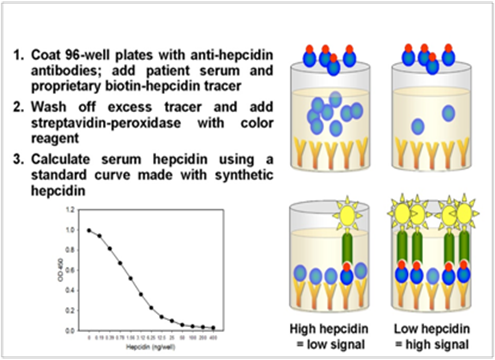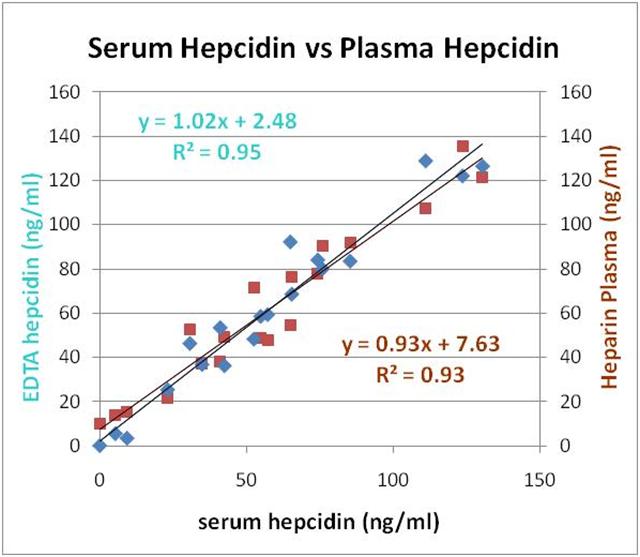Hepcidin Assay Info

Intrinsic LifeSciences performs the world’s first human hepcidin ELISA for leading pharmaceutical companies and clinical investigators worldwide.
We are the world’s leading provider of innovative in vitro diagnostics and targeted therapeutics for iron overload diseases, anemia, and iron-related inflammatory diseases & offer the only immunoassay for the key hormone regulating plasma iron levels in the human body.
Hepcidin Assay Information
Yes the Intrinsic LifeSciences hepcidin assay and tracer are patented (Patent # 7,723,063 and 7,745,162).
Currently the hepcidin assay is not FDA approved. However, it has been validated in several peer-reviewed studies and is marketed as a Research Use Only assay. The validation results are reported in articles by Ganz et al. (Blood, 2008 112: 4292-7), Young et al. (American Journal of Clinical Nutrition, 2009 89:533-8) and Melis et al. (Haematologica, 2008, 93:1473-9). We have performed hepcidin analysis for academic, clinical, government and pharmaceutical customers, worldwide.
Hepcidin is measured in plasma, serum, urine and other body fluids using a patented tracer and a competitive enzyme-linked immunosorbent assay (ELISA).

The Intrinsic LifeSciences cELISA accurately measures hepcidin in both serum and plasma.

Serum and plasma hepcidin is stable for at least 3 years when samples are stored either at -80°C or -20°C. Urine hepcidin is stable for at least 1 year when samples are stored at -80oC. We do not have sufficient stability data for storage of urine at temperatures less than -80°C. Stability testing updates will be provided as they become available.
Normal serum hepcidin in adult women: 17-286 ng/ml
Normal serum hepcidin in adult men: 29-254 ng/ml
Normal urine hepcidin in adult women: 126-986 ng/mg creatinine
Normal urine hepcidin in adult men: 71-1762 ng/mg creatinine
Creatinine is measured in the urine sample to normalize urine hepcidin based on renal function.
Hepcidin concentrations can be reported as either nM or ng/ml. To convert between the two units use the following guidelines:
1 nM = 2.789 ng/ml
1 ng/ml = 0.358 nM
Hepcidin could be present in virtually any body fluid. To date we have measured hepcidin in plasma, serum, urine, saliva, cerebral spinal fluid, cord blood, amniotic fluid and peritoneal dialysis fluid.
Sample Collection for Hepcidin Assay
For serum, collect blood from fasting subjects in a red top tube (for example BD #366431). Immediately after blood collection, place the tubes upright in a rack and allow blood to clot at room temperature for a minimum of 2 hours.
For plasma, collect blood from fasting subjects in a tube containing either lithium heparin (green top, for example BD #367884) or EDTA (purple top, for example BD #367861). Invert tubes several times immediately after collection and place horizontally on a platform rocker at moderate speed for 2 hours at room temperature.
To harvest serum or plasma, centrifuge the tubes at 1500xg for 15 minutes and collect supernatant. Transfer 0.25 ml into a clean 0.5 to 2.0 ml cryogenic vial and store frozen until shipment.
For urine, collect first morning urine at mid stream and transfer 0.25 ml into a clean 0.5 to 2.0 ml cryogenic vial and store frozen until shipment.
To minimize sample loss during liquid handling, we prefer externally threaded cryogenic vials (for example USA Scientific Safety-Seal Screw Cap Tubes, cat# 1405-9700 or for example Nalgene System 100 cryoware). If desired, contact us for advice regarding selection of cryogenic vials for your project.
After collection, it is preferred that serum, plasma and urine samples be stored at -80oC until shipment. Alternatively, if a -80oC freezer is not available, serum and plasma samples can be stored at -20oC until shipment. We do not have sufficient information for storage of urine at temperatures less than -80oC.
The minimum sample volume required for the hepcidin assay is 0.25 ml. This volume is necessary to meet our liquid handling requirements and ensures sufficient volume for sample repeats, if necessary. Smaller sample volumes can be accepted upon request, particularly for infant and pediatric studies.
Samples held at room temperature for 12 or more hours.
Samples that thawed during transport.
Samples that are largely hemolyzed or obtained from frozen whole blood.
Request Hepcidin Assays
How to order the hepcidin assay?To order, please call 1-858-459-1758 or email us at [email protected]. The cost of the assay is dependent on the number of samples you wish to submit. To measure hepcidin in urine, we perform an additional urine creatinine assay, at a modest cost.
Hepcidin assay turn around time is 2-3 business weeks. However we may report the results sooner, depending on the workload.
Shipping Information for Hepcidin Assay
For shipment of biological substances on dry ice, the package must consist of three components: a primary receptacle (e.g. a cardboard cryogenic storage box with divider or similar device), a secondary package that includes absorbent material, and a rigid outer package such as an insulated, leak-proof, thermal shipping container. The sample tubes are placed inside the primary receptacle, the primary receptacle is placed inside the secondary package in such a way that, under normal conditions of transport, they cannot break, be punctured or leak their contents. If leakage does occur during transport, the absorbent material inside the secondary package will contain the spill. The secondary package is placed into the leak-proof shipping container and dry ice is placed around and above the secondary package.
All samples must be shipped on dry ice in an approved leak-proof container, by overnight delivery. Always consult national and international regulations for the safe shipment of biological substances on dry ice. Use sufficient dry ice to allow for a 2 day transit time, in case of a delivery delay. Always ship samples on Monday, Tuesday or Wednesday for overnight delivery. We can receive samples any day from Monday through Friday during regular business hours. We routinely receive international shipments from World Courier and FedEx. Contact your preferred carrier for additional shipment instructions and schedules.
Ship all properly packed samples to:
Intrinsic LifeSciences
505 Coast Boulevard South, Suite 408
La Jolla, CA 92037
Attention: Dr. Gordana Olbina (858-459-1758 ext 104)
